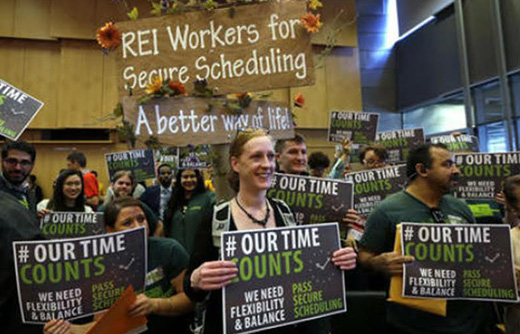
On two consecutive days last week, the Council of the District of Columbia and the Seattle, Washington, city council each voted on bills to require employers to improve their workplace scheduling practices so that workers and their families can better plan their lives.
The Seattle council approved their bill; the DC council did not.
According to a report by the National Women’s Law Center (NWLC) “Employees increasingly face ‘just-in-time’ scheduling practices, including being given very little notice of their work schedules, being sent home early when work is slow without being paid for their scheduled shifts, and being … [required to] call their employer or wait to be called by their employer, often within two hours of their potential shift, to find out whether they will be required to report to work.”
This plays havoc on the lives of employees, especially low wage workers. Hardest hit are single moms.
Not knowing when and for how long they will be at work makes it virtually impossible for workers to arrange for child care, meet with their children’s teachers or, for that matter, to have a good home life or to give their children the consistent attention they need.
If workers try to adjust their work schedules to meet the needs of their families, they are often penalized, according the NWLC, which reports that “more than a third of parents say they have been ‘passed over’ for a promotion, a raise, or a new job due to a need for a flexible work schedule.”
To counter this trend, there is a growing movement to pass laws aimed at making workplace scheduling more fair to workers.
This past year, Senator Elizabeth Warren, D.-Mass., introduced the Schedules That Work Act. In 2014, San Francisco passed a Retail Workers’ Bill of Rights, which provides scheduling protections for employees in certain types of jobs. In the same year, legislators in Michigan introduced a similar bill.
Furthermore, legislators in California, Connecticut, Illinois, Indiana, Maine, Maryland, Massachusetts, Minnesota, New York and Oregon introduced bills to curb unfair scheduling practices.
The ordinance that was adopted in Seattle last week requires that workers get two weeks advance notice of work schedules. If an employer suddenly cuts or extends workers’ hours, they get extra “predictability” pay. Furthermore, under the new law there has to be a minimum of 10 hours between shifts and employers have to offer any available hours to existing employees before hiring more people.
The ordinance was the result of a year-long campaign by Working Washington, a statewide, union-backed coalition. Called the Secure Scheduling Act, it was passed unanimously and will take effect in July, 2017.
It covers only food service and retail business that have 500 or more employees in Seattle or nationwide. Full-service restaurants with fewer than 40 locations are exempt.
“With this law passing, I will be able to know what days I’m really working to plan for child care, health care appointments and finally will be able to attend school functions for my three kids,” grocery worker Jeanette Randle told Seattle’s KIRO TV Channel 7.
DC bill tabled permanently
It was a different story in Washington, DC.
Almost 200 low wage workers and their allies crammed into the District Council chamber September 20 and demanded that the council pass a proposed bill similar to the measure that the Seattle City Council had adopted the day before.
But by a vote of nine to four, the DC Council tabled the proposal, which under DC legislative procedures effectively killed it.
Council members had yielded to pressure from Target, Best Buy and other big-box retailers who opposed any fair scheduling bill. For example, the Wegmans grocery corporation had threatened not to move into the District if the bill passed.
The DC defeat disappointed Elizabeth Falcon, executive director of DC Jobs with Justice.
“The council let down thousands of our neighbors who work in retail and food service,” Falcon said. “By tabling this legislation, they gave into big business lobbyists instead of looking out for hard-working residents in our lowest-paying industries.”
Councilmember Elissa Silverman, a former Newspaper Guild member, vowed to continue to fight for an effective fair scheduling ordinance.
Photo: Seattle passes Secure Scheduling Law | Elaine Thompson/AP










Comments